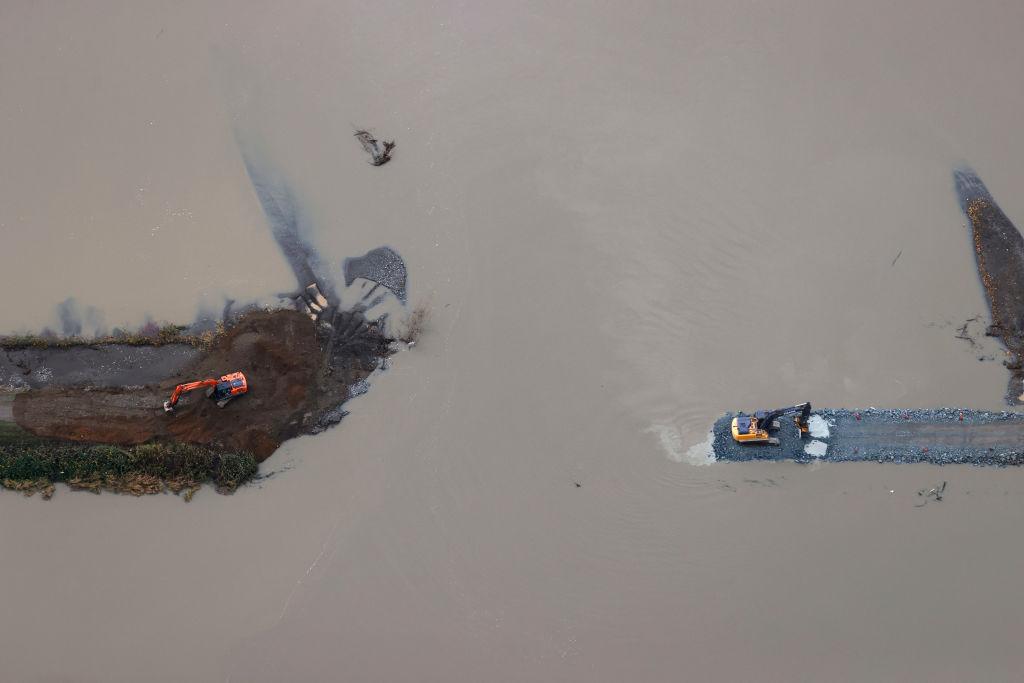
Planet A
Heavy rain and floods in British Columbia have stranded more than 18,000 residents and sparked a widespread disaster response, including from the Canadian air force and army. The region experienced more than a month’s rainfall in a single weekend from an intense channel of moisture known as an atmospheric river. After a brief hiatus, British Columbians are now bracing for another storm that could bring up to 80 millimetres of rain.
Extreme weather events are fast becoming the norm for the western Canadian province. A record-breaking heat wave in June and July killed hundreds and triggered bushfires. In turn, the fire-damaged ground worsened the impact of landslides and flooding during this month’s rains. ‘Once in a century’ weather events are becoming more frequent as climate change accelerates, and the British Columbian floods demonstrate how past disasters exacerbate future ones through compounding effects.
Canada’s military response raises questions about whether dependence on armed forces for disaster relief is logistically and economically viable as climate catastrophes become more frequent. A Pentagon official raised similar concerns recently, saying the US Army is unprepared for climate change. An alternative being discussed in Canada is training civilian response teams.
Democracy watch
Both Argentina and Chile went to the polls in the past fortnight, with the two countries returning similar results: significant swings to the right.
Argentina’s incumbent Peronist government lost its senate majority for the first time in nearly 40 years to the conservative Menemist opposition, but it was the rise of far-right leader Javier Milei—who refuses vaccination, ‘denies climate change is real, describes himself as a “lion”’ and named his dogs after economists of the Chicago school—that grabbed headlines.
Chile’s swing to the right was more profound, with right-wing and term-limited incumbent Sebastián Piñera giving way to ‘ultra’ far-right José Antonio Kast, who wants to dig an ‘enormous ditch’ to keep migrants out and whose supporters often chant ‘viva Pinochet’ at rallies, referring to Chile’s former fascist dictator.
Kast’s victory in the first round of the presidential election has been attributed to his rhetoric of offering a ‘firm hand’ in the face of recent unrest and his campaign’s disinformation strategy, described by critics as straight out of the ‘manual’ of Brazil’s Jair Bolsonaro and former US president Donald Trump.
Information operations
Last week, the US Justice Department indicted two Iranian hackers for alleged involvement in a disinformation campaign targeting American voters before the 2020 presidential election. Seyyed Kazemi and Sajjad Kashian are accused of attempting to obtain voter information from several states, hacking a US media company’s networks and sending threatening emails to thousands of voters. While the indictment didn’t explicitly link the hackers to the Iranian government, US Treasury sanctions and a statement by Secretary of State Antony Blinken both described the men as ‘state-sponsored actors’.
US officials quickly identified the disinformation campaign last year, but it is not an isolated incident. In a joint alert, US, UK and Australian cybersecurity agencies recently noted that Iranian government-sponsored groups were exploiting Microsoft vulnerabilities to carry out ransomware attacks targeting US critical infrastructure and Australian companies. While these attacks were relatively unsophisticated, Iran’s increasingly aggressive cyber operations have some analysts concerned.
Follow the money
Australia will reopen its borders to overseas students and skilled migrants, which will help revive the tertiary education sector and address significant worker shortages in almost every industry.
Higher education remains Australia’s fourth largest export despite its $1.9 billion pandemic-related revenue loss. But long-term pandemic-related disruptions for overseas students will continue to impede the industry’s recovery. Australia’s limited post-study work options are also pushing international students to seek opportunities elsewhere, and reopening borders might not guarantee the sector’s ongoing financial viability.
The health and hospitality sectors have been particularly affected by shortages due to Covid-19, and the government has announced it will allow 20,000 skilled-worker visa holders who stayed in Australia over the pandemic to apply for permanent residency. While the measure is expected to provide some short-term relief, more will likely be needed if Australia is to return to the levels of migration that existed—and supported the economy—before the pandemic struck.
Terror byte
A suicide bombing at a hospital in the British city of Liverpool, carried out by Iraqi asylum seeker Emad al-Swealmeen on Remembrance Sunday, has renewed the debate about the relationship between terrorism and mental illness. Al-Swealmeen arrived in a taxi and detonated a homemade bomb, which triggered a fire that killed him and injured others.
UK police declared the incident a terrorist attack but are still investigating al-Swealmeen’s motives, since the categorisation appears to have been based more on his methodology than on a clear ideology. Al-Swealmeen’s refugee request was rejected by the Home Office and he reportedly had a history of mental health problems, leading the UK’s terrorism watchdog to call for terrorism to be treated like other crimes exacerbated by mental illness.
In another incident involving a refugee last year in Reading, Khairi Saadallah’s killing of three men was attributed to his mental state. However, the debate is murky, with some arguing that those living with mental illnesses are far more likely to be victims of violent attacks than to carry them out.